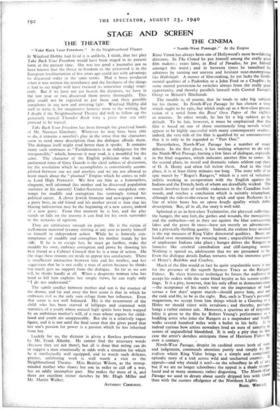STAGE AND SCREEN
THE THEATRE
" Take Back Your Freedom." At the Neighbourhood Theatre IF Winifred Holtby had lived it is unlikely, I think, that her play Take Back Your Freedom would have been staged in its present form at the present time. She was too good a journalist not to have known that the threat to freedom as she perceived it in the European totalitarianism of five years ago could not with advantage he discussed today in the same terms. Had it been produced when it was written the trenchancy and the freshness of the things it had to say might well have excused its somewhat stodgy stage- craft. But if we have not yet beaten the dictators, we have in the last year or two discussed them pretty thoroughly. This play could not be expected to put them and their possible complexes in any new and arresting light. Winifred Holtby did well to write it, for imaginative honesty went to the writing, but I doubt if the Neighbourhood Theatre did well to follow up the genuinely topical Thunder Rock witn a piece that can only pretend to be topical.
Take Back Your Freedom has been through the practised hands of Mr. Norman Ginsbury. Whatever he may have been able to do, it remains a novelist's play in the sense that the characters seem to need more description than the dialogue affords them. The dialogue itself might read better than it speaks. It contains many such sentences as " Fastidiousness is an indulgence for the irresponsible," which, however it may read, is a mouthful for the actor. The character of the English politician who leads a uniformed force of Grey Guards is the chief subject of discussion, for the revolution which he accomplishes is conveniently accom- plished between one act and another, and we are not allowed to learn much about the " planned " Empire which he comes to rule as Lord High Protector. We first see him as a humourless, eloquent, well informed (his mother and he discussed population statistics in his nursery) Under-Secretary whose outspoken con- tempt for muddle and corruption has seemingly ruined his political career. A clever Jewish financier and newspaper owner, a party boss, an old friend and his mother reveal to him that his blazing indiscretion may be the beginning of a new career, indeed of a new party. From that moment he is lost, and the play stands or falls on the reasons it can find for his swift surrender to the ecstasies of egotism.
They are satisfactory enough on paper. He is the victim of %ell-meant maternal tyranny striving at any cost to justify himself to himself in independent action. While he is honestly con- temptuous of muddle and corruption his mother stands by his side. If he is to escape her, he must go further, make the muddle his own, embrace corruption and prove by shooting his best friend at a Cabinet Council that he is a man of action. On the stage these reasons are made to appear less satisfactory. There is insufficient interaction between him and his mother, and her suggestion that he is not really a man of action because he thinks too much gets no support from the dialogue. So far as we can tell, he thinks hardly at all. When a desperate woman who has tried to kill him explains her simple views, he can reply only " I do not understand."
The subtle conflict between mother and son is the essence of the drama, and far and away the best scene is that in which he embraces evil as the only sure refuge from her influence. Even that scene is not well balanced. His is the resentment of the child who has been starved of lollipops and crammed with statistics, of a youth whose natural high spirits have been warped by an ambitious mother's will, of a man whose regrets for child- hood and youth are unappeasable. But she is a relatively vague figure, and it is not until the final scene that she gives proof that her son's passion for power is a passion which he has inherited from her.
Luckily for us, the dictator is given a flawless performance by Mr. Frank Allenby. He cannot find the necessary words (because they are not there), but all is done that acting can do to suggest a man emotionally at odds with a situation for which he is intellectually well equipped, and to watch such delicate, precise, unfaltering work is well worth a visit to the Neighbourhood Theatre. Miss Beatrice Wilson, as the strong- minded mother who shoots her son in order to call off a war, has an oddly incomplete part. She makes the most of it, and there are excellent minor sketches by Mr. Hugh Miller and Mr. Martin Walker.
ANTHONY COORMAN.






























 Previous page
Previous page